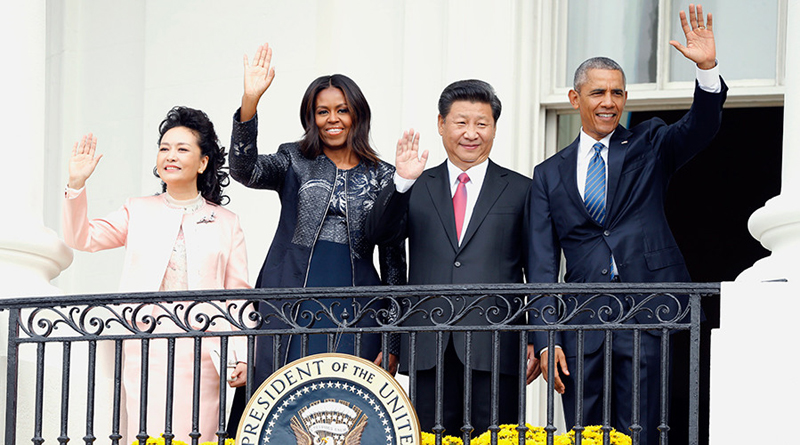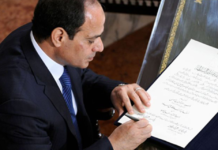It seems that the year of the sheep is affecting Chinese relations with other countries, carrying benefit for all sides, and this appears clearly when President Xi Jinping of China visited the US last week in a delegation that included Chinese business leaders and officials. The visit continued talks that started last April regarding an agreement to reduce carbon emissions, as well as technology and cyber issues.
The cap-and-trade initiative builds on a deal that Xi and US President Barack Obama reached last year in Beijing, where both set steep emissions-reduction targets as a precursor to the global climate accord. Mr Obama, who has made climate change a priority issue in his presidency, finally reached a starting point to launch his plan. China will halt the growth of its emissions by 2030. Domestic and external pressures have driven the Chinese government to take firmer action to curb emissions from fossil fuels, especially coal. Growing public anger about pollution in Beijing and many other Chinese cities has prompted the government to introduce restrictions on coal and other sources of smog, with the side benefit of reducing carbon dioxide pollution. The authorities also see economic benefits in reducing fossil fuel use.
China pledges to put in place a “green dispatch” programme intended to create a price incentive for generating power from low-carbon sources, providing finance to poorer countries to help them pay for projects that reduce harmful emissions, and will agree to “strictly limit” the amount of public financing that goes toward high-carbon projects.
In 2012, China started pilot cap-and-trade programmes in seven provinces, intended to serve as tests for a national programme. Under a cap-and-trade system, a concept created by American economists, governments will place a cap on the amount of carbon pollution that may be emitted annually. Companies can then buy and sell permits to pollute. Western economists have long backed the idea as a market-driven way to push industry to cleaner forms of energy, by making polluting energy more expensive.
Yet, will adding expenses to costs of production lead to costs forwarding to the consumer? Abolishing use of coal or gradually reducing annually its use in industry remains the most direct approach to solving the problem, critics say, especially that China’s economy depends heavily on cheap coal-fired electricity and such a change may come at high cost to the Chinese industry. However, since this is China’s first commitment to a specific plan to carry out policies to reduce carbon emissions, observers are optimistic regarding this development and look forward to the Paris meeting in December for an active agenda.
The Chinese announcement comes less than two months after Obama unveiled his signature climate change policy; a set of Environmental Protection Agency regulations that would force power plants to curb carbon emissions. The rules could shut down hundreds of heavily polluting coal-fired plants. They have drawn fire from Republicans and coal-state lawmakers, but international negotiators say Obama’s regulations have helped break a long deadlock between the United States and China on climate change.
The two nations’ main dish during Mr Xi’s visit was working to strike a deal that would reopen a high-level dialogue over cyber issues and set minimum standards, such as a mutual commitment not to attack each other’s critical infrastructure during peacetime. Mr Xi said that “China is ready to set up a high-level joint dialogue mechanism with the United States on fighting cybercrimes.”
The Internet forum was rescheduled to fit the Chinese leader’s visit. The forum has been an annual event for the past eight years, but the Chinese asked for it to coincide with Mr Xi’s trip so it could be used as a way to recover relations. America had complaints about cyber theft, forced technology transfer, regulations that discriminate against American companies and accusations that China has stolen American commercial secrets that have been passed to Chinese companies. The first in line to meet Mr Xi was Mark Zuckerberg, the chief of Facebook, who spoke in Chinese and got a laugh from the Chinese leader. Among those who greeted Mr Xi were Timothy D. Cook, the chief of Apple; Virginia M. Rometty, the head of IBM; Jeffrey P. Bezos, the chief of Amazon and Jack Ma, the head of the Chinese retailer Alibaba.
American technology companies have had vastly different levels of success in penetrating the Chinese market, whose size makes it an attractive target.
The main services of Facebook and Google are blocked by China’s firewall and censorship polices, and the fact that Mr Zuckerberg was so prominently placed in the receiving line for Mr Xi seemed to suggest his strong desire to overcome the government’s obstacles.
Software from Microsoft is ubiquitous on computers in the country, but high rates of piracy and weak intellectual property enforcement have stifled its revenue from China.
Meanwhile, other companies have come to depend more and more on the increasing affluence of Chinese consumers for their growth. Apple, whose iPhone is a coveted device in the country, got more than 25 per cent of its nearly $50 billion in revenue in its most recent quarter from China.
As the Internet forum was underway, Mr Xi toured a Boeing manufacturing plant, and then arrived at Microsoft for a demonstration of the company’s HoloLens technology.
At meetings around Seattle, American executives and Chinese leaders signed deals to emphasize the spirit of cooperation. Microsoft alone announced more than a half-dozen agreements, including with the Chinese Internet giant Baidu and the Sichuan provincial government to expand the use of its products in China. But much of the American business community is still sceptical — and await actions that speak louder than words.












